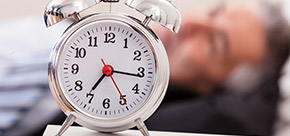Are you short-changing yourself when it comes to sleep? According to the Centers for Disease Control and Prevention, 30 per cent of employed adults are falling short of the recommended seven to nine hours of sleep per night.
Bad sleep patterns negatively impact your long-term productivity, memory, judgement and affect your skin and sex drive.
Research found that those who began work at or before 6am slept an average of only six hours. People who adopted a pro-sleep mentality, who began work between nine and 10am, managed to fit in about 7.29 hours of sleep per night.
The results of the research findings were published online in the journal Sleep, and included a simple solution to rectify bad sleep patterns: Start your day one hour later.
“Results show that with every hour that work or educational training started later in the morning, sleep time increased by 20 minutes”, explains the research release.
The belief is that people with flexible schedules feel better about going to work. An extra hour in the morning, whether for sleep or relaxation, also makes people more productive during the day.
How to create a pro-sleep culture
Respect chronotypes. Your sleep is controlled by what scientists call chronotypes, or a
“clock gene”. People who are early risers tend to wake up several hours earlier than people who are night owls. It’s a good idea to work out which type you are in order to optimise your sleep patterns. For example, if you’re more of a night owl, avoid scheduling appointments or meetings first thing in the morning.
Avoid working overtime time on devices. Many workers spend hours per day working overtime monitoring work-related business on their smartphones and tablets. One survey found that around 60 per cent of workers monitored their smartphones 13.5 hours or more per day for work, including during the evening. Sending emails long into the night interrupts the brain’s natural shut-down mode, sabotaging optimal sleep opportunities.
Be aware of light. Circadian rhythms are the physical, mental and behavioural changes that your brain goes through to prepare you for being asleep or awake. Your circadian rhythm responds to light and darkness and runs on a 24-hour cycle. Blue-toned white lights can help boost alertness and productivity at work, but at night you should decrease your exposure to light. Exposure to too much light inhibits your body’s production of the sleep hormone, melatonin. So experts recommend avoiding screens, such as TVs, laptops and phones, all which emit blue light.
Read more at News.com.au.

